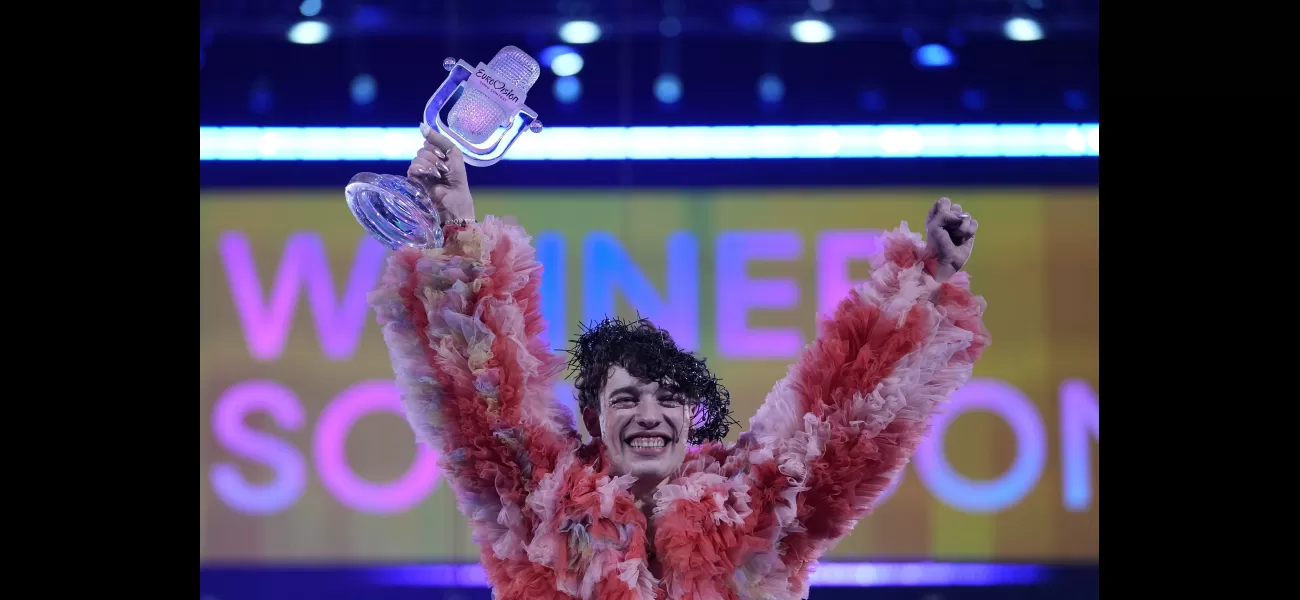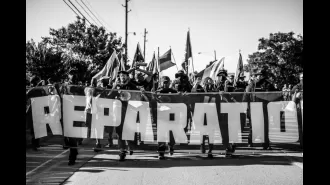Switzerland's Nemo victorious at Eurovision.
Swiss artist Nemo triumphs at Eurovision 2021 with The Code, a blend of opera and rap that reflects their personal journey of embracing a nongender identity.
May 11th 2024.

In a thrilling and emotional night, Swiss singer Nemo made history by winning the 68th Eurovision Song Contest. Their powerful and unique performance of "The Code," a blend of operatic pop and rap, was a celebration of their journey towards embracing their nongender identity. Nemo's victory was well-deserved, as they beat out Croatia's Baby Lasagna to claim the coveted title. The win was determined by a combination of votes from national juries and viewers from around the world.
This was a significant moment for Nemo, as they became the first nonbinary winner in the contest's 65-year history. As they accepted the trophy in the Swedish city of Malmo, Nemo expressed their gratitude, saying, "Thank you so much." They also shared their hopes that the Eurovision Song Contest would continue to promote peace and dignity for all individuals.
This year's Eurovision Song Contest was not without its challenges. It was a tumultuous year for the pan-continental event, with large protests against the participation of Israel, which overshadowed the typically joyous and celebratory atmosphere. The ongoing war in Gaza added to the pressure and intensity of the competition, turning it into a chaotic and tense experience.
Adding to the drama, Dutch competitor Joost Klein was disqualified from the contest after a backstage altercation that was being investigated by the police. Despite these challenges, Nemo rose above and emerged as the champion, beating out finalists from 24 other countries. Each contestant had three minutes to captivate the audience with their catchy tunes and stunning performances.
The musical styles on display ranged from rock, disco, techno, and rap, with some artists even blending multiple genres in their acts. The show also featured some iconic moments, such as the return of ABBA, who won Eurovision with their hit song "Waterloo" 50 years ago. Though they were not present in person, their digital avatars from the ABBA Voyage show made an appearance.
Other notable performances included Ukraine's powerful tribute to their war-torn country, Israel's controversial power ballad, and Finland's quirky and nostalgic act. The competition was a true reflection of Europe's diverse and sometimes perplexing musical tastes, with a strong following from the LGBT community.
Despite the event's motto of "united by music," this year's contest was also divisive. Protests and dissent overshadowed the celebration, with thousands of pro-Palestinian demonstrators marching in the streets of Malmo, demanding a boycott of Israel and a cease-fire in the ongoing Gaza war. The city, with its large Muslim population, was a fitting location for these protests.
The tension and nerves were palpable in the hours leading up to the final. Some artists were noticeably absent from the final dress rehearsal, though they all eventually made it to the stage for the live show. French singer Slimane even used his time on stage to urge for unity and love in the face of trauma and conflict.
In the end, it was Nemo's powerful and moving performance that captured the hearts of the viewers and secured their place in Eurovision history. And as last year's winner Loreen put it, in times of turmoil and trauma, the only thing that can heal is love. And love was certainly in the air at the Eurovision Song Contest, where diversity, inclusivity, and the power of music were celebrated.
This was a significant moment for Nemo, as they became the first nonbinary winner in the contest's 65-year history. As they accepted the trophy in the Swedish city of Malmo, Nemo expressed their gratitude, saying, "Thank you so much." They also shared their hopes that the Eurovision Song Contest would continue to promote peace and dignity for all individuals.
This year's Eurovision Song Contest was not without its challenges. It was a tumultuous year for the pan-continental event, with large protests against the participation of Israel, which overshadowed the typically joyous and celebratory atmosphere. The ongoing war in Gaza added to the pressure and intensity of the competition, turning it into a chaotic and tense experience.
Adding to the drama, Dutch competitor Joost Klein was disqualified from the contest after a backstage altercation that was being investigated by the police. Despite these challenges, Nemo rose above and emerged as the champion, beating out finalists from 24 other countries. Each contestant had three minutes to captivate the audience with their catchy tunes and stunning performances.
The musical styles on display ranged from rock, disco, techno, and rap, with some artists even blending multiple genres in their acts. The show also featured some iconic moments, such as the return of ABBA, who won Eurovision with their hit song "Waterloo" 50 years ago. Though they were not present in person, their digital avatars from the ABBA Voyage show made an appearance.
Other notable performances included Ukraine's powerful tribute to their war-torn country, Israel's controversial power ballad, and Finland's quirky and nostalgic act. The competition was a true reflection of Europe's diverse and sometimes perplexing musical tastes, with a strong following from the LGBT community.
Despite the event's motto of "united by music," this year's contest was also divisive. Protests and dissent overshadowed the celebration, with thousands of pro-Palestinian demonstrators marching in the streets of Malmo, demanding a boycott of Israel and a cease-fire in the ongoing Gaza war. The city, with its large Muslim population, was a fitting location for these protests.
The tension and nerves were palpable in the hours leading up to the final. Some artists were noticeably absent from the final dress rehearsal, though they all eventually made it to the stage for the live show. French singer Slimane even used his time on stage to urge for unity and love in the face of trauma and conflict.
In the end, it was Nemo's powerful and moving performance that captured the hearts of the viewers and secured their place in Eurovision history. And as last year's winner Loreen put it, in times of turmoil and trauma, the only thing that can heal is love. And love was certainly in the air at the Eurovision Song Contest, where diversity, inclusivity, and the power of music were celebrated.
[This article has been trending online recently and has been generated with AI. Your feed is customized.]
[Generative AI is experimental.]
0
0
Submit Comment





